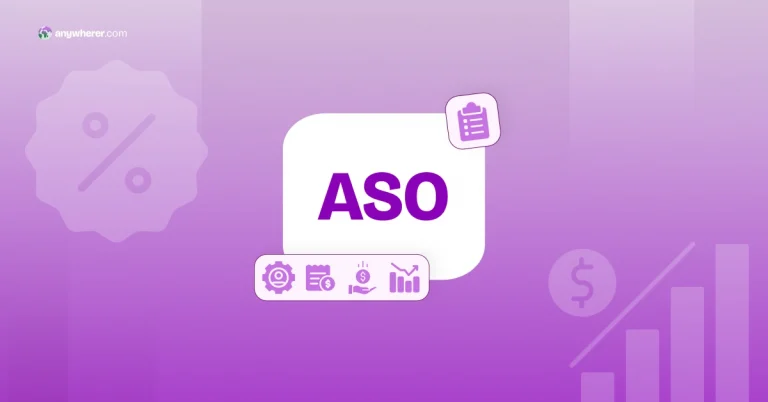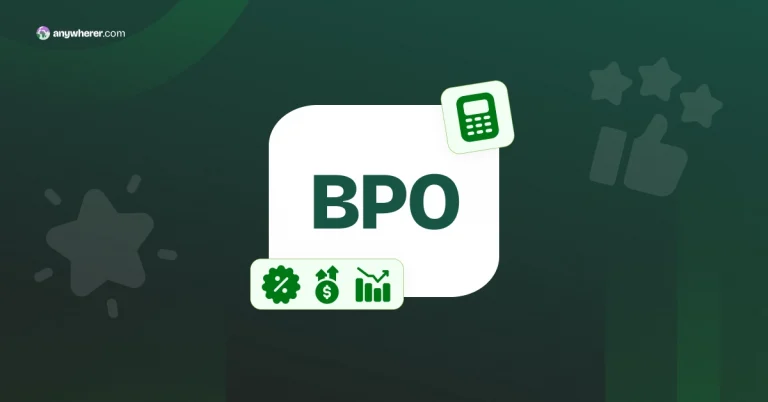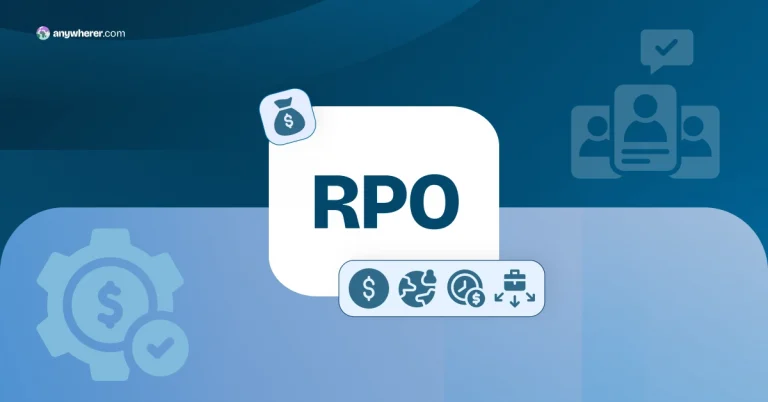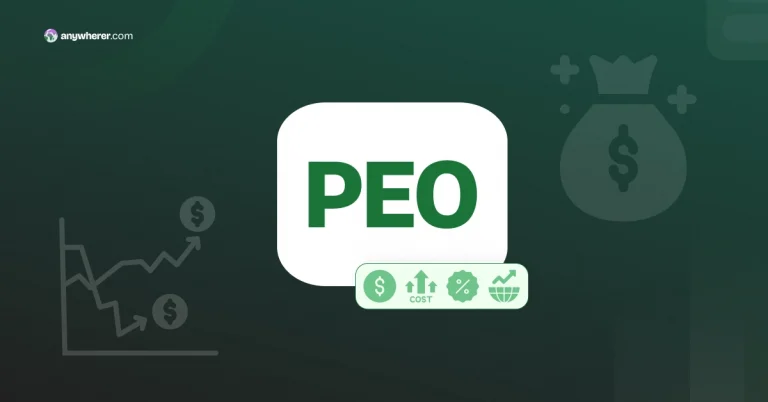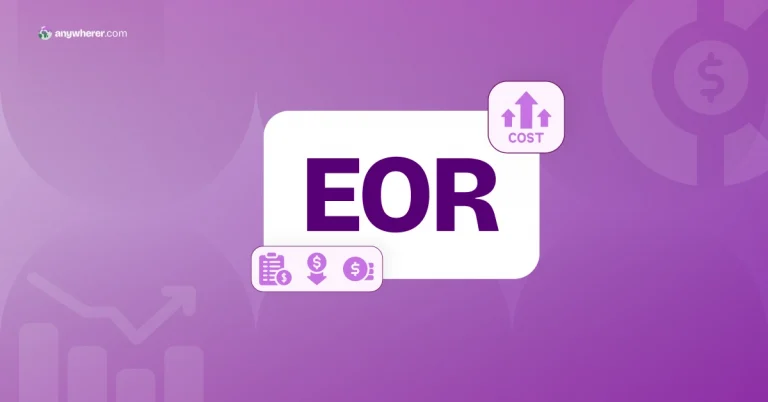The Essentials of HR Outsourcing
HR outsourcing (HRO) is becoming a go-to move for companies looking to streamline operations, reduce costs, and tap into global talent without drowning in admin work. Instead of managing everything in-house, businesses hand off those tasks to external HR experts.
HRO Definition
A business model where companies delegate some or all of their human resources functions, such as payroll, benefits, compliance, and recruitment, to an external provider. It’s a scalable way to manage HR, especially for companies expanding globally.
While this is a brief description, we also suggest you explore the HRO definition further to learn about the benefits and commonly outsourced tasks.
Of course, all support comes with a price tag – and the cost can vary widely. Let’s break down what influences HR outsourcing costs and what you can expect to pay today.
How Much Does HR Outsourcing Cost? Key Factors that Influence the Price
When it comes to HRO pricing, there’s no one-size-fits-all answer. The cost of outsourcing HR services depends on a mix of operational needs, business size, and the structure of the deal. Here’s a deeper look at what really drives the numbers:
Company size/number of employees
The bigger your team, the more moving parts there are to manage, so it makes sense that the HR outsourcing cost increases with company size. More employees mean more payroll entries, benefits enrollments, compliance tasks, and support needs. However, many providers offer volume-based pricing, so the cost per employee may actually go down as your team grows.
Scope of HR services
HR outsourcing pricing is often customized based on what you need. For example, a business might only outsource L&D management while maintaining an internal HR team for other functions. The broader the scope, the higher the price—but the more value you get, too.
HRO pricing model used
How your provider calculates your fees also plays a major role in total cost. Some of the most common HR outsourcing services pricing models include:
- Per employee, per month (PEPM)
- Flat monthly fee
- Percentage of payroll
- Hourly or project-based
These pricing structures can vary widely depending on your company size—for instance, pricing for 1–4 employees might be significantly lower than for 40+ employees, even if the service package is similar.
Geographic coverage
Managing HR for a single-location business is one thing. But if you operate across multiple states—or even countries—expect to pay more. That’s because compliance complexity increases, and providers need to account for varying tax laws, employment regulations, and benefits requirements. The pricing for HR outsourcing services tends to be higher for globally distributed teams, but it can also prevent major fines or legal headaches down the road.
Industry-specific needs
Certain industries—like healthcare, finance, or manufacturing—come with heavier compliance burdens or unique HR requirements. In these cases, providers may need specialized tools or certified experts, which naturally increases the outsourcing HR services cost. The same goes for companies with unionized employees, hourly shift workers, or other non-standard setups.
Factors that Impact HRO Cost
Lower HRO Costs
- Outsourcing fewer services
- Committing to longer-term contracts
- Standardized processes (without customization)
- Single-country operation with fewer compliance requirements
- Outsourcing to lower-cost regions
- Using basic support
Higher HRO Costs
- Using full-service HR support
- Complex workforce structures, combining remote teams, contractors, multiple entities, etc.
- Industry-specific compliance
- Custom solutions and highly flexible contracts
- Add-ons, like insurance or tech provisioning
Typical HR Outsourcing Cost Ranges in 2025
Understanding the cost of outsourcing HR services is crucial for budgeting and strategic planning. While actual expenses can vary based on company size, industry, and specific needs, we pulled information from sources, such as Forbes, QuickBooks, SHRM, ProMatcher, PwC, and others, to show what the HR outsourcing average costs may look like for core HR functions:
- Payroll processing. Vendors can charge a base monthly fee of $20 to $180, plus per-employee fees of $4–$20. If we take the average figures and do the math, for a company of 25 employees, they will add up to $15,600 a year. In contrast, an in-house specialist will cost approximately $64,865 annually.
- Benefits administration. The cost will, of course, depend on the type of benefits a company wants to provide. For example, the U.S. average for employer-sponsored health care is over $16,000 per person annually.
- HR compliance and advisory services. In the U.S., such specialists charge an average of nearly $143/hour, so the total cost will depend on how many hours they need to process your requests and inquiries.
- Employee onboarding and offboarding. Salary.com says a recruiter’s median wage is $29/hour. If a company has 10 new hires a month, and a specialist needs 2 hours to onboard each one, the monthly onboarding cost will add up to $580. Additionally, employees may need devices and technology, which raises the cost per hire. You can apply the same logic to offboarding, with the difference in the need to recover corporate property.
HR Outsourcing Pricing Models: An Overview of Common Offerings
So, how much does outsourcing HR cost? Providers typically offer a few different pricing structures depending on your size, needs, and the services you’re after. Here’s a quick overview of the most common models:
№1. Per Employee, Per Month (PEPM)
Example: $199 per employee/month
This is one of the most popular models, especially for ongoing services like payroll, benefits administration, and compliance support — you pay a flat fee for each employee, every month. It’s best for companies that want predictable, scalable costs.
№2. Flat Monthly Fee
Example: $499/month for a team of 20–49 employees
A consistent monthly charge, often based on your company’s size or service scope. When pricing HR outsourcing activities with this model, instead of paying based on headcount, you’re charged a fixed amount per month for a bundled set of services.
№3. Percentage of Payroll
Example: 12% of your total payroll per month
Often used by PEOs (Professional Employer Organizations), this model ties costs directly to how much you’re paying your team. You’re charged a percentage of your total monthly or annual payroll.
While PEOs offer HR solutions, please note that there are distinctions in the scope of services offered by PEO vs HRO.
№4. Hourly or Project-Based
Example: $900 for 10 credit hours a month
This model is common for consulting or one-off services like HR audits, policy creation, or leadership training. You’re billed hourly or by the project scope.
Hidden Costs in the HR Outsourcing Pricing to Watch for
It’s easy to focus on the headline rates—like the HR outsourcing cost per employee or the flat monthly fee. Even when working with the best HR outsourcing companies, there can be unexpected add-ons that sneak up on you.
Here are some of the most common hidden costs associated with outsourcing HR, plus a few smart ways to keep your budget under control.
- One-time setup fees. Most vendors charge an initial onboarding or implementation fee, which covers the time and effort to set up your account, systems, and data migration. These can easily range from $500 to $2,000, depending on the company size and business complexity.
- Equipment provisioning. If your provider helps onboard new employees remotely, they might also handle laptops, peripherals, or office supplies. And that convenience often comes with an extra charge to the cost of HR outsourcing.
- Medical insurance and benefit plan fees. While benefits administration might be included, the actual benefits (like health plans, life insurance, etc.) aren’t. Some providers mark up plans or charge extra for premium options or international coverage.
- HRIS software licenses. Many HR outsourcing firms bundle in access to their own tech platform or HRIS—but if you need advanced analytics, integrations, or user seats, you could end up paying more.
- Add-on services. You might only realize later that essentials like background checks, performance reviews, policy updates, or training modules aren’t included in the package.
- Contract flexibility. Need to cancel or scale down before your agreement ends? You may face early termination fees or penalties for dropping services.
The takeaway? Always read the fine print, and don’t be shy about asking providers to break down the total cost of ownership, including extras.
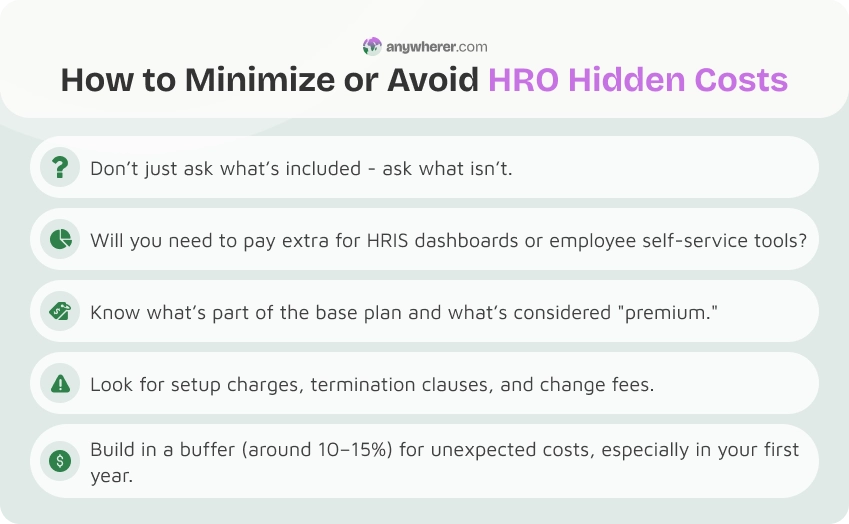
Is HR Outsourcing Worth It? Let’s Talk Cost vs. Value
By now, you might be asking the big question: Is outsourcing HR really a better deal than keeping it in-house? The short answer? For many businesses—especially those growing fast—the answer is yes.
Let’s break it down.
1. The financial case: How does HR outsourcing reduce cost?
Maintaining an internal HR team involves more than just salaries. Think about HR manager’s salary, payroll software licenses, benefits consultants, ongoing training & compliance resources. When you outsource, these costs are often bundled into a single, predictable monthly fee. You’re not paying for downtime, hiring, or turnover.
2. Beyond the numbers: Non-financial value
Here’s what else you gain with outsourcing—things that can be hard to quantify but offer huge value:
- Reduced risk of compliance errors, tax mistakes, etc.
- Access to experts in payroll, benefits, compliance, hiring, and more.
- Less time managing HR and more – growing your business.
- An outsourced HR partner can scale alongside a company.
3. The ROI of HR outsourcing
Think of HR outsourcing as an investment, not just an expense. Businesses that outsource smartly often see lower admin costs, fewer compliance issues, better hiring and retention, and faster ability to scale operations.
So, is HR outsourcing worth it? For many companies, especially those scaling up, the value extends far beyond what’s on the invoice.
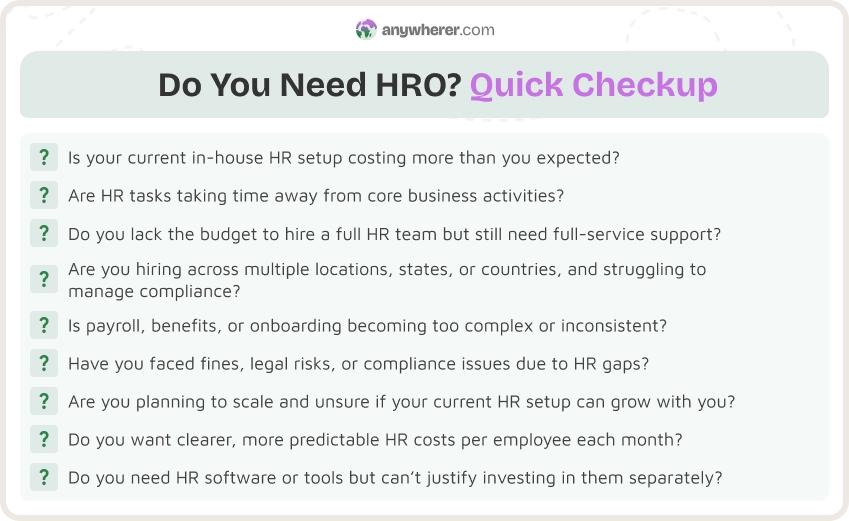
HR Outsourcing Costs: Key Takeaways
Before you dive into an HRO partnership, it’s important to go in with a clear view of both the costs and the value. Here’s a quick recap of what we’ve covered:
- HR outsourcing costs vary depending on your company size, service scope, and pricing model.
- Basic services like payroll and compliance are more affordable than full-service packages that include benefits, onboarding, and tech tools.
- Asking the right questions can help you choose the right provider and avoid surprises.
Bottom line? When done right, HR outsourcing isn’t just a cost-saving move—it’s a growth-enabler.
FAQs on HRO Costs
How is HR outsourcing typically priced?
HR outsourcing costs usually come in a few standard packages. The most common models are: per employee per month (PEPM), percentage of payroll, and flat monthly fee. Providers can also tailor pricing to your needs, so the best way to get clarity is to ask for a custom quote.
How do HR outsourcing costs vary by company size?
Size definitely matters when it comes to HRO pricing. Of course, as headcount goes up, your per-employee rate usually goes down thanks to economies of scale. However, the more employees you have, the more you will pay overall.
Do outsourcing costs change based on the industry or location?
Yes, and here’s why. Highly regulated industries like finance, healthcare, or government usually pay more for compliance-heavy HR support. Also, if your roles are hard to fill (think tech or engineering), recruiting costs through an outsourced partner can be steeper. And if your team is spread across multiple states or countries, expect higher costs due to complex labor laws, tax requirements, and benefit plans.
Are there hidden fees businesses should be aware of?
Yes, and they can sneak up on you if you’re not careful. The fine print may include onboarding or setup fees (one-time charges to get started), early termination fees (if you want out before your contract ends), add-on services like talent acquisition, background checks, or training modules, and compliance updates.
Make sure your HR outsourcing costs deliver real business impact – discover how to maximize ROI from your HR partnerships.

Yaryna is our lead writer with over 8 years of experience in crafting clear, compelling, and insightful content. Specializing in global employment and EOR solutions, she simplifies complex concepts to help businesses expand their remote teams with confidence. With a strong background working alongside diverse product and software teams, Yaryna brings a tech-savvy perspective to her writing, delivering both in-depth analysis and valuable insights.

